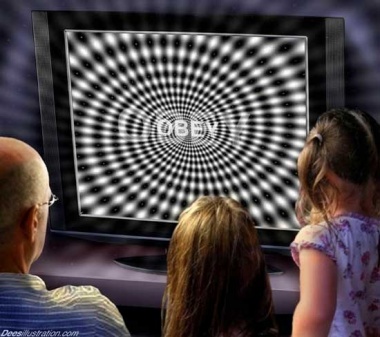Consensus trance
 | |
| Founder(s) | Richard Heinberg |
| Probably coined by Richard Heinberg, this phrase indicates a collective agreement not to let objective reality (such as the finite nature of fossil fuels or mendacious behaviour of particular individuals) to impinge on a shared belief system, generally more or less in agreement with the official narrative. | |
This term was coined by Richard Heinberg in his writings about 9/11 and Peak Oil. He in turn probably adapted it from Robert Anton Wilson's notion of "Consensus Reality". It refers to the psychology that requires the (possibly tacit) acceptance of the "Official Narrative" through the absorption of sub-conscious blocking out of unpleasant and unpalatable truths about the world, one's country, society, belief system etc., in order to get through the day and concentrate on the deeply establishly routines of life. Remarkably, most people are quite willing to suspend belief in their own senses in order to conform to a group[1].
Contents
Regulating group mind
Canadian academic John McMurtry introduced the roughly equivalent concept of the "regulating group mind" in his 2004 paper, File:Understanding 911 and 911 wars.pdf.
The facts of 9-11 which are disconnected from are now copiously documented. But why and how these facts are ruled out by the masses and elites at the same time is not explained. The argument has been at the first-order level of the facts, not the lawlike operations on the facts by the collective thought-system that selects, ignores and reconnects them in new form - what I call the “regulating group-mind” (RGM). Only when we understand this meta-level of constructing the facts and their meaning in accordance with their conformity to and expression of a pre-existing structure of understanding can we know what is going on or, more specifically, can we find our way out of the anomalies and disconnects of our era.[2]
McMurtry postulates a “regulating group-mind” or socially regulating syntax of thought and judgement which blocks out
- all evidence against its assumptions; and
- the destructive effects which reveal its delusions.
Importance
McMurtry underlines the importance of understanding the nature of the regulating group mind, even suggesting:
The RGM may lie behind every systematic social pathology of our era. In each case, it blocks out facts and connections of life-and-death significance, and in each instance, its exclusion is a variation on one life-blind thought regime, the “shadow subject” of our era.[2]
Asch's research on Conformity
In 1955 psychologist Salomon E. Asch conducted experiments about peer pressure in social groups. In "Opinions and social pressure"[3] he concluded that conformity is an inherent mechanism for social behaviour (of individuals in a group) that may lead to alter individuals' perception and lead them to judge falsely so as to satisfy the group's opinion - even if this opinion is obviously false.[4].
The effect of conformity is so strong that polls may create a self-fulfilling prophecy, especially when polls show a high percentage of accordance influence on public opinion is inevitable. In some countries polls are forbidden before elections for this reason. Another example are images that appear to show masses of people, i.e. the Charly Hebdo propaganda. Statements such as "Our troups took over and are now in total control" might be have a similar effect, if contradictory evidence can be suppressed. Planners of psychological operations know well how the human need to belong to a social group makes people vulnerable for this sort of manipulation by forces such as the commercially-controlled media.
Speculation
McMurtry's suggestion has an interesting (and unexplored) connection with the speculations of Graham Gynn and Tony Wright about the dominance of the (life blind) left-hemisphere of the brain. The left brain has a demonstrated ability to confabulate logical explanations for poorly explained phenomena.[5][6]
Related Document
| Title | Type | Publication date | Author(s) | Description |
|---|---|---|---|---|
| File:Understanding 911 and 911 wars.pdf | commentary | 30 May 2004 | John McMurtry | A guide to understanding the events of 9-11 and the resulting wars for which it became the casus belli |